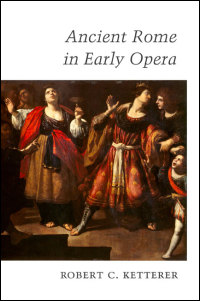
Ancient Rome in Early Opera
A grand portrait of early Italian opera's use of Roman history,
from the perspectives of classical literature and musical history.
from the perspectives of classical literature and musical history.
The major historians of ancient Rome wrote their works in the firm belief that the exalted history of the Roman Empire provided plentiful lessons about individual behaviour, inspiration for great souls, and warnings against evil ambitions, not to mention opportunities for rich comedy.
The examples of Rome have
often been resurrected for
the opera stage to display the
exceptional grandeur, glory, and tragedy of Roman figures.
When modern opera developed in the baroque period,
Rome provided settings and subject matter for librettists and composers.
As opera spread to England and Germany, the treatment of Roman subjects changed to reflect national differences.
Ketterer tracks the changes as operas’ Roman subjects cross generations and national boundaries.
Ketterer also pays close attention to the composers’ individual approaches to developing their librettos.
Following opera from its origins in seventeenth-century Venice to Napoleon’s invasion of Italy, Ketterer shows how opera was preoccupied with Roman historical figures as heroes, lovers, and fools.
Monteverdi, Handel, Mozart, and Cimarosa were only the most renowned of the many composers drawn to Roman subjects.
Handel in particular is a unifying figure in this history.
Handel began his career in Germany, refined his craft in Italy, and rose to heights of renown in England, composing for aristocracy and royalty alike.
Roman history provided these composers with all the necessary courage and intrigue, love and honour, and triumph and defeat so vital for the stirring music that makes great opera.
The examples of Rome have
often been resurrected for
the opera stage to display the
exceptional grandeur, glory, and tragedy of Roman figures.
When modern opera developed in the baroque period,
Rome provided settings and subject matter for librettists and composers.
As opera spread to England and Germany, the treatment of Roman subjects changed to reflect national differences.
Ketterer tracks the changes as operas’ Roman subjects cross generations and national boundaries.
Ketterer also pays close attention to the composers’ individual approaches to developing their librettos.
Following opera from its origins in seventeenth-century Venice to Napoleon’s invasion of Italy, Ketterer shows how opera was preoccupied with Roman historical figures as heroes, lovers, and fools.
Monteverdi, Handel, Mozart, and Cimarosa were only the most renowned of the many composers drawn to Roman subjects.
Handel in particular is a unifying figure in this history.
Handel began his career in Germany, refined his craft in Italy, and rose to heights of renown in England, composing for aristocracy and royalty alike.
Roman history provided these composers with all the necessary courage and intrigue, love and honour, and triumph and defeat so vital for the stirring music that makes great opera.
A marvelous book.
Ketterer has performed a signal service in bringing his classical knowledge to the attention of musicologists, and his musical perceptiveness to the community of classicists.
Classical Journal
A very fine book, recommended to all who are interested in opera before (and including) Mozart.
Comparative Drama.
A wealth of insightful and virtuosos interpretations of many of the best-known historical characters in early Italian opera.
Early Music
Ketterer has performed a signal service in bringing his classical knowledge to the attention of musicologists, and his musical perceptiveness to the community of classicists.
Classical Journal
A very fine book, recommended to all who are interested in opera before (and including) Mozart.
Comparative Drama.
A wealth of insightful and virtuosos interpretations of many of the best-known historical characters in early Italian opera.
Early Music
This work is a welcome addition to our understanding of opera's rich musical tradition.
Robert C. Ketterer is a rare classicist who also knows his way, musically and historically, in the world of baroque opera.
R. J. Tarrant, editor of the Oxford Classical Texts edition of Ovid's Metamorphoses
This enjoyable, compelling, and beautifully organized book is a truly significant contribution to the field.
It is a must read for music historians and directors of staged performances of baroque opera, but also essential for political and social historians and those interested in comparative literature.
Ellen T. Harris, author of Handel as Orpheus: Voice and Desire in the Chamber Cantatas
Robert C. Ketterer is a rare classicist who also knows his way, musically and historically, in the world of baroque opera.
R. J. Tarrant, editor of the Oxford Classical Texts edition of Ovid's Metamorphoses
This enjoyable, compelling, and beautifully organized book is a truly significant contribution to the field.
It is a must read for music historians and directors of staged performances of baroque opera, but also essential for political and social historians and those interested in comparative literature.
Ellen T. Harris, author of Handel as Orpheus: Voice and Desire in the Chamber Cantatas





No comments:
Post a Comment